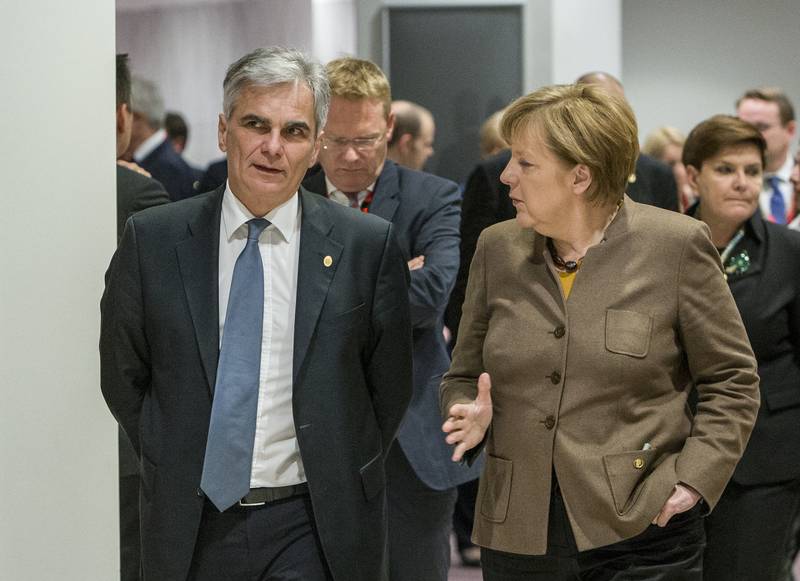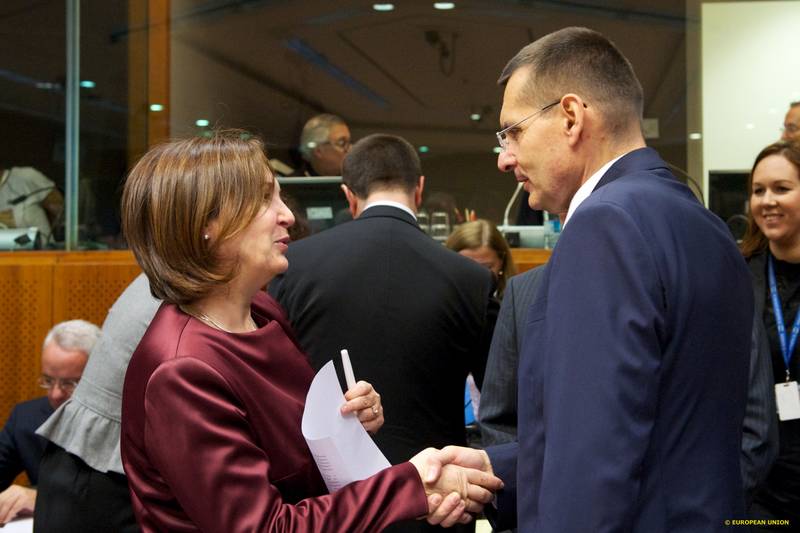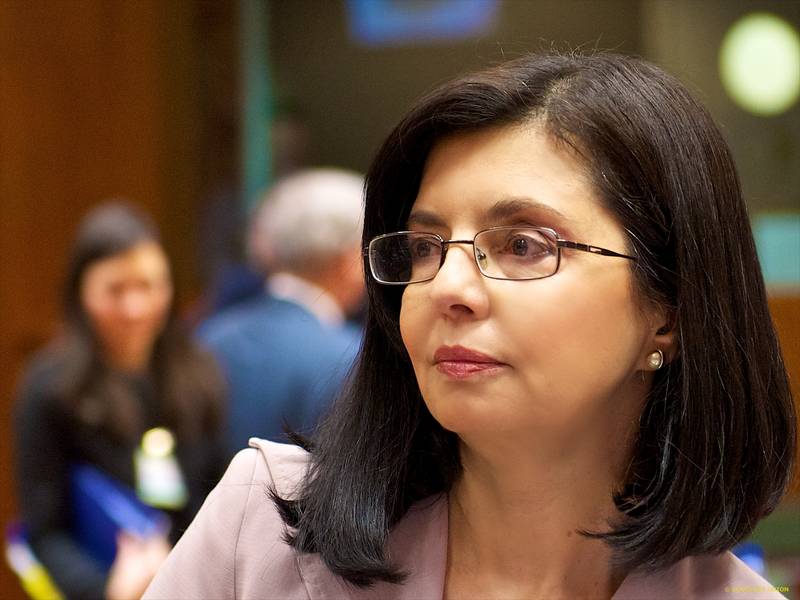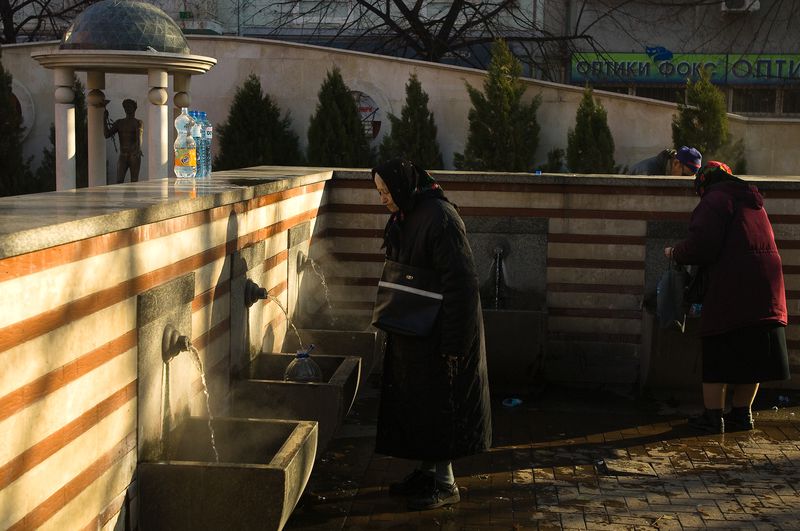Bulgaria Has One Last Chance to Show Results under the CVM
Ralitsa Kovacheva, February 10, 2012
 Bulgaria has one last chance to prove that it has made progress in fighting corruption and organised crime, as well as in reforming its judicial system. This is the tone of the interim report of the European Commission on Bulgaria's progress under the Cooperation and Verification Mechanism (CVM), published on 8 February. The mechanism has been imposed on Bulgaria and Romania with their accession to the EU in 2007. In July 2012 the Commission will prepare a ‘mega report’, summarising the results of the CVM`s five-year functioning in both countries. Until then, Bulgaria has to prove that the last five years were not a waste of time. This is stated in the plain text in the report itself: "Further efforts are therefore needed during the coming months in order to demonstrate convincing results and to contribute to the Commission's overall assessment in summer 2012 of progress achieved by Bulgaria under the CVM."
Bulgaria has one last chance to prove that it has made progress in fighting corruption and organised crime, as well as in reforming its judicial system. This is the tone of the interim report of the European Commission on Bulgaria's progress under the Cooperation and Verification Mechanism (CVM), published on 8 February. The mechanism has been imposed on Bulgaria and Romania with their accession to the EU in 2007. In July 2012 the Commission will prepare a ‘mega report’, summarising the results of the CVM`s five-year functioning in both countries. Until then, Bulgaria has to prove that the last five years were not a waste of time. This is stated in the plain text in the report itself: "Further efforts are therefore needed during the coming months in order to demonstrate convincing results and to contribute to the Commission's overall assessment in summer 2012 of progress achieved by Bulgaria under the CVM."
As Commission spokesman Mark Gray explicitly noted while presenting the reports on Bulgaria and Romania, the interim reports are purely technical and generally do not involve political assessments. He repeated this twice, perhaps because of rumours in some Bulgarian media that the Bulgarian authorities were lobbying the report to mention the government`s "political will".
But as we have repeatedly noted, the technical reports can sound much more slashingly than the annual political reports, where political assessments rather mask the problems. And this very report contains conclusions which are much stronger than any political assessment and represent a ruthless diagnosis. Besides "the usual suspect" - the Supreme Judicial Council and the usual conclusion about the need for more professionalism in the work of the police, the report highlights as well another important issue – the inexplicable wealth of the political class.
In this respect, Bulgaria is not simply doing nothing, but apparently is ignoring explicit recommendations by the Commission. Brussels has particularly recommended the new law on asset forfeiture to empower the Committee for the Identification and Forfeiture of Criminal Assets to initiate assets verification of senior officials and politicians. However, the report says, "this aspect does not seem to be pursued." Currently the law is being discussed in Parliament and Brussels keeps insisting that it "needs to be comprehensive, and backed up with strong institutions, if it is to be effective in dissuading organised crime and high-level corruption."
At the same time, in the last six months, there are no developments in the control system of asset declarations of senior civil servants in order to detect and pursue inexplicable wealth, the paper notes. It is no accident that namely this issue was raised by a foreign journalist at the press conference of the European Commission. The reporter asked whether the Commission had any legal mechanisms to act, since it appeared that the Bulgarian political establishment ignored the recommendations, particularly as regards the investigation of politicians' illegal wealth. Mark Gray, a Commission spokesman, recalled that there had been safeguard clauses before but today there was no legal provision, allowing the Commission to impose sanctions in case recommendations were not met.
Judicial reform - greater transparency and integrity
The Supreme Judicial Council (SJC) "enjoys" again special attention in the report: "A reform of the election process of the Supreme Judicial Council is needed to enhance the Council's transparency and integrity." The Commission notes that the credibility of the Supreme Judicial Council has been in question and recommends reforms to be carried out before the expiry of the current Council's mandate in autumn 2012. The SJC will probably not be pleased with the recommendations for greater transparency and accountability of its work, for example - committee meetings to be open to the public or to observers from the civil society, and to provide live web-streaming of the Council's meetings.
As to the appointment, appraisal and career development of magistrates, the report notes that the implementation of the reformed Judicial System Act has not yet delivered the expected changes. "Upcoming appraisals and promotions should demonstrate their capacity to properly reflect differences in performance and to take integrity issues fully into account." Because “appointing and promoting competent magistrates of high integrity is an important part of judicial reform.” The latter is very important, given the apparent unwillingness of the "system" (not only the judiciary) to accept integrity as an equally significant criterion, as legality. The Bulgarian society needs to be reminded that not everything can be decided by law, but nothing can be decided without morality.
The Ministry of interior - professionalism, instead of creativity
In recent months there has been little development on important cases related to organised crime, the report concludes. And once again the reason is not in the judiciary, as the Bulgarian minister of interior often says: "Further improvements in investigative practise, in terms of investigation techniques and in the collection of evidence remain to be demonstrated through enhanced professionalism during police actions." Apparently, the Ministry of the Interior should invest more efforts in collection of evidence, rather than in the creation of attractive names of the police operations.
The same message we find regarding the reform of police investigative practise, aiming to result in "a higher number of indictments meeting high professional standards, as well as final court decisions in organised crime cases."
However, the issue of donations to the interior ministry has not yet been solved: "Although donations to police have been limited to public authorities and state-owned companies and are now entered into a public register, the practise of donations to police still raises questions regarding accountability and financial transparency, notably the risk of circumventing public procurement rules".
As regards public procurement, which has been strongly emphasised in previous CVM reports, the Commission says only that legislative amendments have been adopted towards strengthening the control and the staff of both competent authorities in the area of public procurement, but the impact of these measures will depend on their practical implementation.
The prosecution to investigate vote-buying and fraud of EU funds
The Commission specifically focuses on another problem, which it apparently believes should not be swept under the carpet - the investigation of allegations of electoral fraud during the presidential and local elections last October. The elections were mentioned for the first time in the July report, which said that they would be the first test for the new Electoral Code. Now the Commission stresses that the fight against vote-buying is "essential for public trust the authorities' ability to fight organised crime and corruption." The same applies to the full transparency of political party financing in accordance with the recommendations of GRECO [Group of States against Corruption].
The Prosecution, which has been a subject of special attention in the annual report from July 2011, now is criticised directly for doing nothing on several cases of alleged fraud with EU funds, "though investigations into related cases based on the same facts continue in another Member State." Nothing has been done too as a follow up of the information provided by European Anti-Fraud Office OLAF, concerning serious irregularities in the management of EU funds in the past two years.
"In all cases related to fraud of EU funds brought to court in 2011, criminal responsibility was replaced by administrative fines" and an important case of fraud of EU funds has been delayed in appeal in court for over 18 months.
It was the abuse of EU funds that was the reason in 2008 the Commission to adopt a separate report on the issue and to punish Bulgaria with a temporary freeze of EU funds. The report from 2008 was considered the most critical in the CVM history so far. The current, modestly called "technical" report, however, sounds like a final warning not only because of the forthcoming comprehensive evaluation of the CVM for the past five years. And not only because of the overall alertness on how every single euro is spent, amid the ongoing crisis. The context is much broader.
Although the Commission keeps denying any link between the CVM and Bulgaria's (and Romania's) accession to Schengen, the report demonstrates in practise how valid doubts are about the country’s readiness for Schengen membership. Not to mention the direct recommendation the country to strengthen the fight against corruption in the local authorities and, note - at the borders. What is lacking in Bulgaria is obviously not the technical equipment – it is professionalism, rules and integrity, and not only in the judiciary, police and political class. The proof is in the ongoing public tolerance for this lack.
The Commission has reinvented the wheel, some will say. Others will recall that Croatia joined the EU without a CVM (exactly as a result of the lessons learned from the accession of Bulgaria and Romania) and will ask for its abolishing. Obviously, the European Commission is also in a stalemate, trying to invent the CVM`s future, so as not to abolish it and at the same time – the CVM not to seem completely useless, as it does now. How will Brussels get out of this awkward situation we will find out in July. For the Bulgarian citizens, though, there is no way out. With or without the CVM, it depends on us to decide in what country we want to live, because, ultimately, it is just about that.
 Werner Faymann, Angela Merkel | © Council of the EU
Werner Faymann, Angela Merkel | © Council of the EU Rumyana Bachvarova, Petre Toba | © Council of the EU
Rumyana Bachvarova, Petre Toba | © Council of the EU Meglena Kuneva | © Council of the EU
Meglena Kuneva | © Council of the EU Entrance to the Berlaymont building | © EC - Audiovisual Service
Entrance to the Berlaymont building | © EC - Audiovisual Service | © European Union 2020, EC - Audiovisual Service
| © European Union 2020, EC - Audiovisual Service Commission President Ursula von der Leyen | © European Union 2019 - Source: EP
Commission President Ursula von der Leyen | © European Union 2019 - Source: EP | © European Union
| © European Union | © euinside
| © euinside | © EU
| © EU